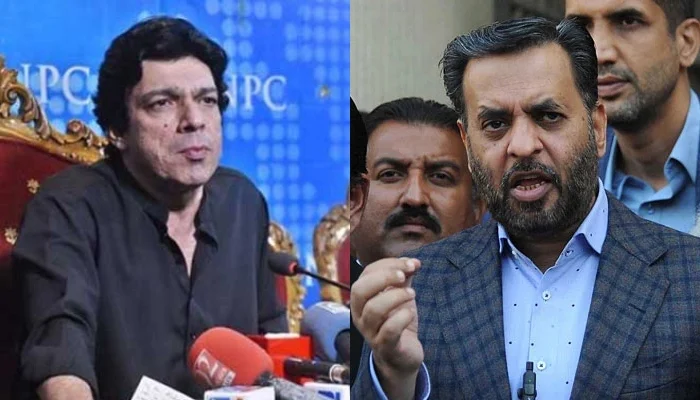Mohsin Siddiqui (Chief Reporter)
On Friday, the Supreme Court of Pakistan issued contempt of court notices to Senator Faisal Vawda and Muttahida Qaumi Movement-Pakistan (MQM-P) leader Mustafa Kamal following their controversial press conferences that criticized the judiciary. The case, which has captured significant public attention, is being heard by a three-member bench led by Chief Justice of Pakistan (CJP) Qazi Faez Isa, alongside Justices Naeem Akhtar Afghan and Irfan Saadat Khan.
Background and Legal Context
The Supreme Court took suo motu notice of Faisal Vawda’s explosive press conference, where he severely criticized the judiciary and specifically called out Islamabad High Court (IHC) judge Babar Sattar, demanding that he present evidence supporting his allegations about intelligence agencies meddling in judicial affairs. The advocate on record for this case is Additional Attorney General (AAG) Aamir Rehman.
During the initial proceedings, Chief Justice Qazi Faez Isa inquired if AAG Rehman had listened to Vawda’s press conference. Rehman confirmed he had heard portions of it. The court then deliberated on whether the content of Vawda’s statements constituted contempt of court. CJP Isa emphasized that while expressing opinions on pending cases is permissible, actions that aim to undermine the respect and integrity of judicial institutions are unacceptable.
“If I have done something wrong, tell me, not the court,” CJP Isa remarked, highlighting the need to maintain the dignity of institutions. He acknowledged the presence of both good and bad individuals within the legal system but stressed that personal grievances should not be used to demean the judiciary.
CJP Isa expressed his commitment to transparency within the judiciary and discussed his efforts to reduce his own powers to enhance institutional integrity. He condemned personal attacks and underscored that in a civilized society, such behavior is rare. He recounted an incident where he was accused of election rigging, questioning the plausibility of such accusations against a chief justice.
Referring to the press conferences by Vawda and Kamal, Justice Isa stated that they took undue advantage of his leniency and chose to make defamatory statements in public forums rather than through appropriate parliamentary channels. He reiterated that while constructive criticism is welcome, targeting judicial institutions is detrimental to the country.
The court issued show-cause notices to both Vawda and Kamal, scheduling the next hearing for June 5. The court also requested video recordings and transcripts of the press conferences. The AAG was summoned to assist further in the proceedings.
The Supreme Court’s written order reiterated the fine balance between freedom of expression, protected under Article 19 of the Constitution, and the prohibition against contempt of court. The court asserted its openness to scrutiny and emphasized that individuals with evidence against judicial misconduct should present it formally. The Supreme Court Bar Association (SCBA) representatives supported the court’s actions against contempt.
Faisal Vawda’s Press Conference
In his press conference, Vawda challenged Justice Sattar to provide concrete evidence of intelligence agencies meddling in judicial matters. He argued that without proof, such allegations harm the credibility of the judiciary. Vawda, who was disqualified for dual nationality at the time of his 2018 election nomination, also questioned why the renunciation of dual nationality applies solely to politicians and not to judges.
This case highlights the ongoing tensions between political figures and the judiciary in Pakistan. The Supreme Court’s actions underscore the importance of maintaining judicial respect and integrity, even as it navigates criticisms and allegations from high-profile individuals. The emphasis on resolving issues through formal channels rather than public outbursts aims to preserve the decorum and effectiveness of Pakistan’s judicial system.
The involvement of high-ranking officials and the SCBA’s agreement with the court’s stance further emphasize the collective effort to uphold judicial dignity and address any grievances through proper legal procedures. This case serves as a reminder of the critical role that both the judiciary and public figures play in fostering a respectful and functional legal environment in Pakistan.




